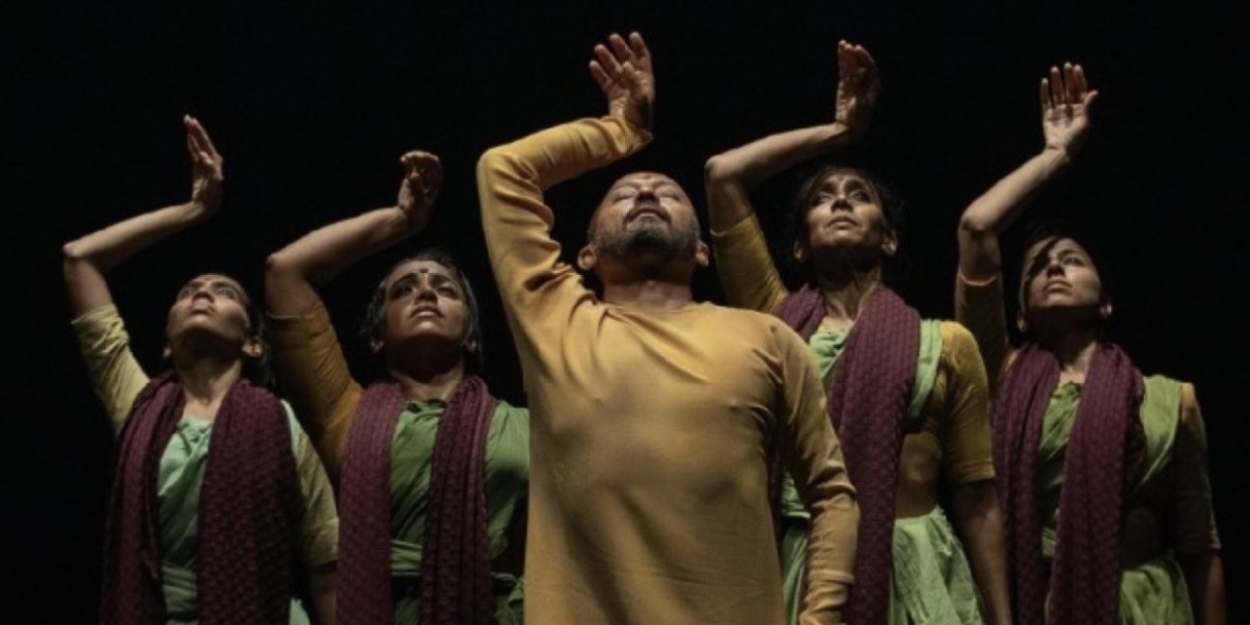Review Roundup: GIGENIS at Sadler's Wells
Performances will run until Sunday 24 November.

Sadler's Wells Associate Artist Akram Khan has returned to Sadler's Wells Theatre through Sunday 24 November as director and performer in the UK premiere of GIGENIS:
The generation of the Earth. Khan shares the stage with an ensemble of renowned artists of Indian classical dance including Kutiyattam artist Kapila Venu, Bharatanatyam soloists Mavin Khoo and Mythili Prakash, duo Vijna Vasudevan and Renjith Babu, and Sirikalyani Adkoli —with a score devised and performed through a collaboration of seven live Indian Classical musicians.
Drawing from his deep-seated connection to traditional practices and his ability to weave narratives through movement, Khan's GIGENIS transcends time, invoking the collective memories of our civilisation. GIGENIS represents not just a performance but a profound statement— a testament to the enduring resonance of tradition in a rapidly changing world.
Although many will be familiar with Khan's work as a choreographer, it is a rarer occasion to witness him perform. GIGENIS marks Khan's first performance on the London stage for four years.
GIGENIS: The generation of the Earth follows a critically acclaimed run of Khan's Giselle with the English National Ballet, which returned to Sadler's Wells in September for the first time in five years. See what the critics are saying...
Lyndsey Winship, The Guardian: There is brief, not hugely illuminating text (Khan’s usual impressionistic way with dramaturgy) and, especially without expert knowledge of these forms, it is unlikely you would understand every subtlety of gesture. But they are all deeply convincing in their worlds and it is engrossing even if you don’t get the meaning. In a nice line in the programme, Khan says that, in the modern world, we need to “see it in order to believe it”, while for Khan’s grandparents it was the other way round, “we must believe in it in order to see it”. You believe in these dancers.
Debra Craine, The Times: The mother — Mother Earth? — is played by Kapila Venu, a tower of strength and a galvanising presence. Through her, Khan seems to be honouring the joy, pain and resilience of all women everywhere. Khan, in his return to London the stage after a four-year absence, and Mavin Khoo deliver intense and agile performances as the warring brothers.
Zoe Anderson, The Independent: Khan’s characters fall somewhere between individuals and archetypes. There’s a wonderful wedding dance for the mother, and a solo full of rage, but less sense of her as a person. Between the shared roles and subdued production, the narrative can be hard to follow. Individual scenes shine out, but there’s less sense of motivation or drive. Appearing very much as part of the fine seven-strong ensemble, Khan is still a powerful dancer. In solos, he dances with ferocious intensity, shaking with anger after failing to take the crown.
Stephanie Osztreicher, West End Best Friend: There is no shortage of contemporary dance in London, yet GIGENIS reminds us of the value of heritage—be it our own or others. The sharing of this cultural legacy is something special. GIGENIS is a rare, transformative experience. Akram Khan and his ensemble have delivered a performance that London will not soon forget—a celebration of humanity through the timeless, universal language of dance.
Mark Monahan, The Telegraph: Khan is an artist I have long admired, but whose muse has struggled of late. True, Gigenis is not on the same level as, say, his former work-of-art solo shows Desh and Xenos, and it may prove too elliptical for some. But to see his imagination once again firing this keenly, and his body still serving him so magnificently, is something to celebrate.
David Jays, London Evening Standard: Gigenis is less theatrically assertive than some of Khan’s previous works, but creates a resonant hour of expressive dance. Khoo’s brother looks shocked even as he triumphs. Victory feels like loss, and sorrow lands with greater force than joy.
Reader Reviews

Videos

